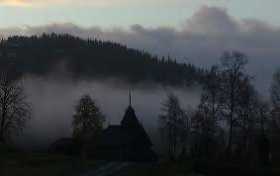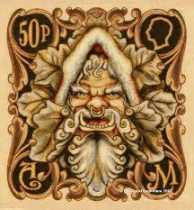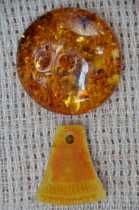It's a truism of religious iconography that every detail bears meaning. So let us ask: Why is the Rällinge Frey stroking his beard?
Surely every pagan must be familiar with the Rällinge Frey. This charming little bug-eyed god was discovered, at his eponymous location, in Sweden—big-time Frey Country back in the old days, be it noted—in 1908.
Wearing nothing but a pointed (skin?) cap—or is it a helmet?—the little bronze god sits cross-legged, sporting an noteworthy erection. His left hand—the forearm is now missing—rests on his left knee. With his right—the strong, or dominant, hand—he strokes (or grasps, or tugs) his beard.
Why?
One can hardly fail to notice, of course, the beard as analogue to the god's phallus, or to appreciate their mutual, um, stroke-ability. The artist here has deftly created a visual dialectic, stunning in its elegant simplicity. This is a god who specializes in the erotic, with all that that implies, but there's more to him than that, far more.
Like every other part of the human (or divine) body, beards bear symbolic meaning. Beards mean: male. They mean: maturity, experience. Thus, in an extended sense, they also mean: wisdom.
Now that the wearing of beards has become culturally fashionable again, I've had occasion over the last few years to watch men interacting with their beards. (Unlike interacting with one's phallus—though, as noted above, certainly analogous to it—it's something that you can acceptably do in public.)
Again and again I've watched men stroke their beards while thinking something over. Stroking the beard means reflection. It means deliberation.
What the artist is showing here is Frey's other side. He's not just the handsome fertility guy with the big toothsome cock, though he's that too. To consult one's beard is to consult one's wisdom. ("Let me consult my beard on that," goes the old Russian proverb. One could even view the beard as a symbol of the Received Tradition, making the Bearded the repository of the Lore.) This is a god who thinks. This is a god who considers. This is a god who reflects before he decides. He's not just cute and good in the sack, but smart and thoughtful, too.
-
 Oh, that dangerous male body. It's so dangerous that there are parts of it that you shouldn't show, or touch, or even talk about
Oh, that dangerous male body. It's so dangerous that there are parts of it that you shouldn't show, or touch, or even talk about -
 Beard play has been on my mind lately. For mysterious reasons to me, I become somewhat self conscious about it in the last couple
Beard play has been on my mind lately. For mysterious reasons to me, I become somewhat self conscious about it in the last couple





















